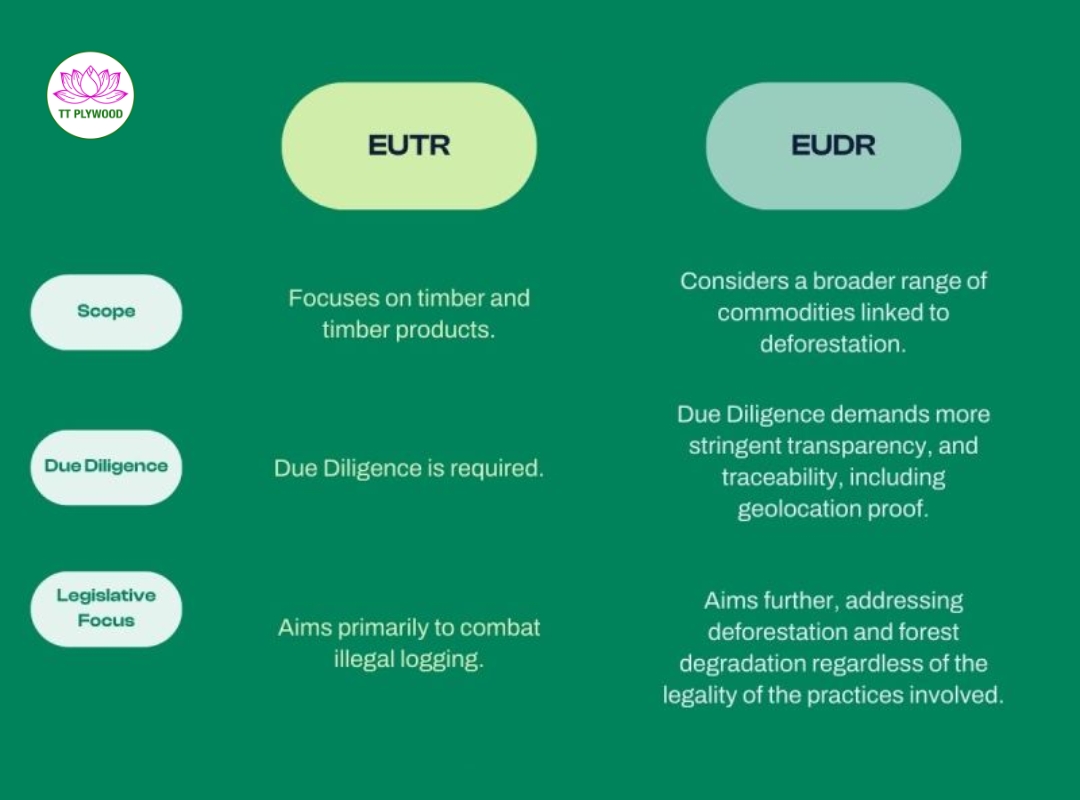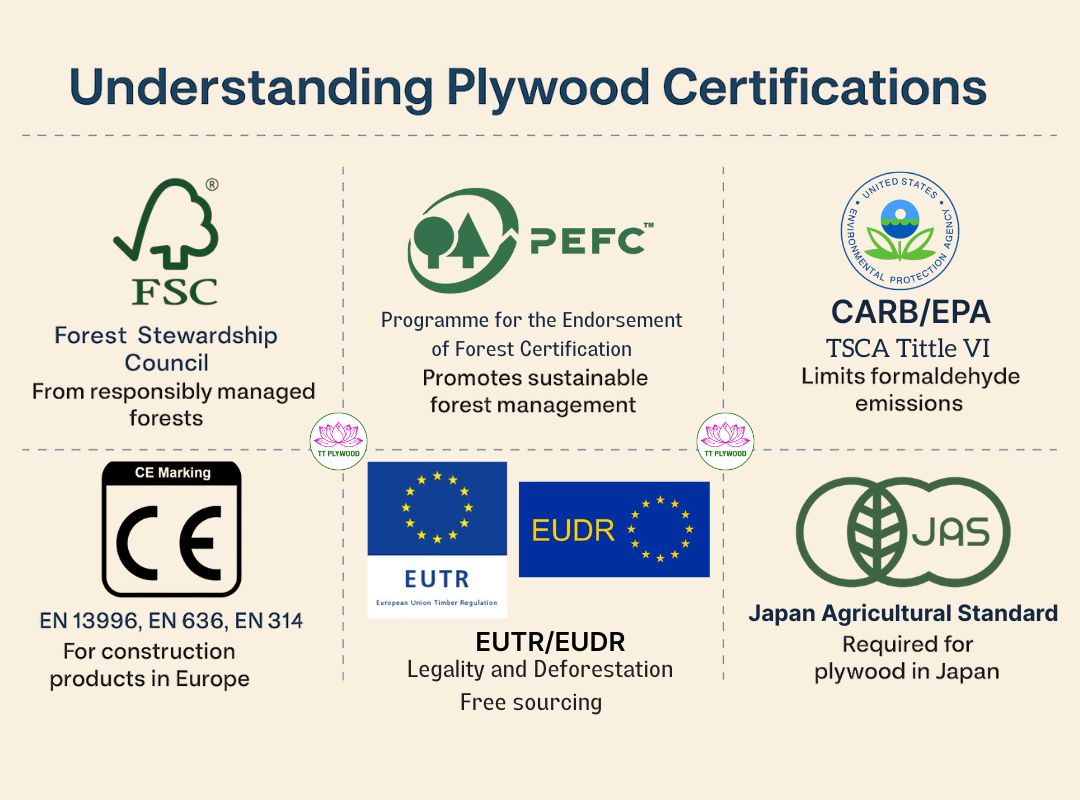-
-
-
Total payment:
-

Plywood Certifications Explained: FSC, PEFC, CARB/EPA, CE, EUTR/EUDR, JAS, and Global Market Requirements
Posted by Thanh Uyên at 11/08/2025
In the global plywood trade, certifications are more than just stamps on paper—they are proof that your products meet the legal, safety, and environmental standards of each market. From sustainable forestry to formaldehyde emission control, the right certification ensures smooth market access, avoids costly shipment rejections, and boosts buyer confidence.
Below, we explain six key plywood certifications recognized worldwide, along with the specific market requirements in Japan, the United States, the European Union, and other regions. We also list additional certifications that can help strengthen your market position.
1. FSC – Forest Stewardship Council
The Forest Stewardship Council (FSC) ensures that wood products come from responsibly managed forests that provide environmental, social, and economic benefits.

- Covers: Sustainable forest management, legal harvesting, and chain of custody tracking.
- Why It Matters: Many government projects and high-end buyers require FSC to demonstrate eco-responsibility.
Market Requirements:
- European Union: Preferred for public projects and green building certifications (e.g., LEED).
- United States: Not legally required, but often demanded by corporate buyers.
- Japan: Growing recognition among eco-conscious importers.
- Global: Seen as a premium quality mark.
2. PEFC – Programme for the Endorsement of Forest Certification
PEFC promotes sustainable forest management through national certification systems.

- Covers: Biodiversity protection, respect for workers’ rights, and legal harvesting.
- Why It Matters: Provides a widely recognized sustainability label when FSC is not available.
Market Requirements:
- EU & UK: Accepted in place of FSC for many procurement projects.
- Australia & Canada: Highly recognized due to strong forestry industries.
- US: Less common than FSC but respected in sustainability-focused segments.
3. CARB/EPA TSCA Title VI – Formaldehyde Emissions Compliance
CARB Phase 2 (California Air Resources Board) and EPA TSCA Title VI regulations limit formaldehyde emissions in composite wood products.

- Covers: Strict testing and labeling for plywood, MDF, and particleboard.
- Why It Matters: Ensures health safety and legal compliance for US imports.
Market Requirements:
- United States: Mandatory for all composite wood imports.
- Canada: Aligns closely with US rules, making compliance beneficial.
4. CE Marking – European Standards
The CE Marking shows conformity with EU health, safety, and environmental requirements.

- Covers: Construction product standards—EN 13986 (construction use), EN 636 (durability), EN 314 (bonding quality).
- Why It Matters: Without CE marking, plywood cannot be legally sold for construction in the EU.
Market Requirements:
- EU: Mandatory for construction-grade plywood.
- UK: UKCA mark now applies post-Brexit, but CE still accepted during transition.
5. EUTR/EUDR – Timber Legality and Deforestation-Free Trade
EUTR (EU Timber Regulation) and EUDR (EU Deforestation Regulation) prevent illegally harvested and deforestation-linked timber from entering the EU.

- Covers: Proof of legal harvest, supply chain due diligence, and geolocation data of forest origin.
- Why It Matters: Non-compliance can lead to fines, shipment seizure, and market loss.
Market Requirements:
- EU: Mandatory for all timber imports.
- Global Impact: Other countries (UK, US, Japan) are introducing similar measures.
6. JAS – Japan Agricultural Standard
JAS defines grading, labeling, and testing for wood products in Japan.

- Covers: Strength, durability, moisture resistance, and formaldehyde emissions.
- Why It Matters: Required for plywood used in structural applications in Japan.
Market Requirements:
- Japan: Mandatory for certain uses; without JAS, products are limited to non-structural purposes.
7. Other Notable Certifications
Beyond the six major ones, other valuable certifications include:
- ISO 9001 – Quality management systems.
- ISO 14001 – Environmental management systems.
- LEED® Credits – Contributes to green building points.
- AS/NZS 2269 – Structural plywood standard in Australia/New Zealand.
Market-Specific Certification Requirements Table
| Market / Region | Mandatory Certifications | Preferred / Optional Certifications |
|---|---|---|
| United States | CARB/EPA TSCA Title VI | FSC, PEFC, ISO 9001 |
| European Union | CE, EUTR/EUDR | FSC, PEFC, ISO 14001 |
| Japan | JAS | FSC, PEFC |
| Australia/NZ | AS/NZS 2269 (for structural) | FSC, PEFC |
| Global Premium Buyers | — | FSC, PEFC, LEED |
Conclusion
Understanding plywood certifications is essential for exporters targeting high-value markets. Each market has mandatory requirements—such as CARB/EPA for the US, CE and EUDR for the EU, and JAS for Japan—as well as preferred certifications like FSC and PEFC that boost buyer trust.
By strategically aligning certifications with market entry plans, exporters can ensure smooth customs clearance, meet sustainability demands, and position their products as high-quality and compliant in a competitive global landscape.
Ready to expand your plywood business to international markets?
Whether you’re targeting Japan, the US, the EU, or beyond, having the right certifications is your passport to success.
📩 Contact us today for expert guidance on meeting FSC, PEFC, CARB/EPA, CE, EUTR/EUDR, and JAS requirements and let’s make your plywood globally compliant and market-ready.
Hotline/WhatsApp/Line/Kakao: +84 32 694 2288
Email: info@ttplywood.com
Frequently Asked Questions (FAQ)
1. Which plywood certification is the most important for the EU market?
For the EU, CE marking and EUTR/EUDR compliance are mandatory. FSC or PEFC are not legally required but are highly preferred for green building projects and public procurement.
2. Is CARB/EPA certification required for all plywood in the US?
Yes, if the plywood contains composite wood components, it must meet CARB Phase 2 or EPA TSCA Title VI formaldehyde emission standards to be legally sold in the US.
3. Do I need multiple certifications for one shipment?
Yes, especially when exporting to multiple markets. For example, plywood shipped from Vietnam to the EU may require CE + EUDR, while the same batch shipped to the US may need CARB/EPA compliance.










